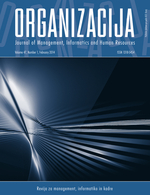Efficiency Analysis of Restaurants in a Small Economy after the Implementation of Fiscal Cash Registers: The Case of Slovenia
Abstract
Background and purpose: The aim is to analyse the efficiency of small and medium-sized (SMEs) restaurant enterprises in Slovenia after the government’s implementation of fiscal cash registers in January 2016. Strict financial supervision and the introduction of fiscal cash registers resulted in increased officially registered sales revenues, higher taxes, and more available and reliable financial data. No previous study has analysed restaurants’ efficiency in the country, as, due to fiscal malpractice, accounting data have not provided a reliable source for accurate efficiency evaluation.
Design/Methodology/Approach: Efficiency was assessed using Data Envelopment Analysis (DEA), based on secondary-financial data provided by the national tax authorities. Data were gathered from 142 independently run restaurant SMEs in 2017.
Results: The average efficiency score of Slovene restaurant SMEs is 85%, which indicates that, on average, restaurants have to increase their efficiency level by 15% in order to improve their efficiency according to the most efficient (best-performing) units under comparison. Our research results indicate a relatively successful and comparable level of efficiency performance in comparison to those found in previous international studies. The results also reveal that the patterns of conducting business operations in terms of efficient management are relatively similar across the restaurant sector. Surprisingly, in terms of determining the influence of different groups of operational variables on restaurants’ efficiency performance, the research results indicate that only operational financial variables (costs of goods sold, labour costs, and depreciation) influence efficiency performance, while managers’ demographic characteristics (gender, age, education, years of experience) and restaurants’ physical characteristics (size, number of competitors, location) have no statistically significant influence on restaurants’ efficiency in achieving net sales revenues.
Conclusion: Secondary-financial data represent a valuable source of information for restaurant companies’ efficiency analysis. The use of selected variables enables an internationally comparable benchmarking process and facilitates the improvement of restaurants’ efficiency performance. It is suggested that future research include longitudinal data and focus on the systematic analysis of other variables (e.g., managers’ psychographic characteristics) that might influence restaurants’ efficiency performance.
Keywords: DEA; efficiency measurement; restaurant industry; Slovenia
Design/Methodology/Approach: Efficiency was assessed using Data Envelopment Analysis (DEA), based on secondary-financial data provided by the national tax authorities. Data were gathered from 142 independently run restaurant SMEs in 2017.
Results: The average efficiency score of Slovene restaurant SMEs is 85%, which indicates that, on average, restaurants have to increase their efficiency level by 15% in order to improve their efficiency according to the most efficient (best-performing) units under comparison. Our research results indicate a relatively successful and comparable level of efficiency performance in comparison to those found in previous international studies. The results also reveal that the patterns of conducting business operations in terms of efficient management are relatively similar across the restaurant sector. Surprisingly, in terms of determining the influence of different groups of operational variables on restaurants’ efficiency performance, the research results indicate that only operational financial variables (costs of goods sold, labour costs, and depreciation) influence efficiency performance, while managers’ demographic characteristics (gender, age, education, years of experience) and restaurants’ physical characteristics (size, number of competitors, location) have no statistically significant influence on restaurants’ efficiency in achieving net sales revenues.
Conclusion: Secondary-financial data represent a valuable source of information for restaurant companies’ efficiency analysis. The use of selected variables enables an internationally comparable benchmarking process and facilitates the improvement of restaurants’ efficiency performance. It is suggested that future research include longitudinal data and focus on the systematic analysis of other variables (e.g., managers’ psychographic characteristics) that might influence restaurants’ efficiency performance.
Keywords: DEA; efficiency measurement; restaurant industry; Slovenia
Refbacks
- There are currently no refbacks.

